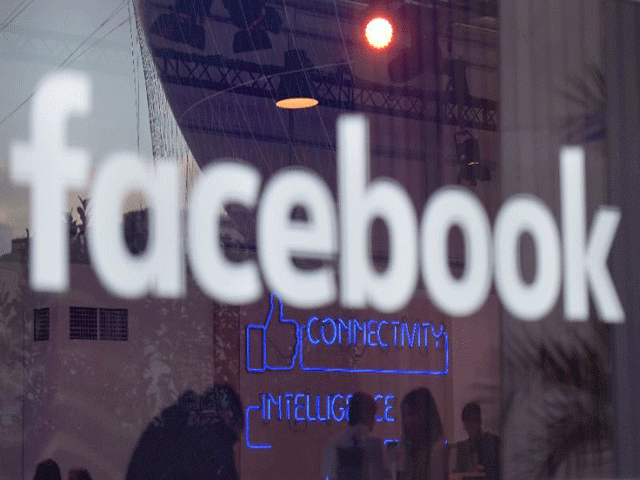Israel and Facebook join hands to decide what is censored
Facebook is facing extreme pressure to censor content disliked by various governments

The Israeli government and Facebook have agreed to work together to determine how to tackle incitement on the social media network
PHOTO: AFP
In its effort to censor the photo, the company even removed it from the account of Norwegian Prime Minister, who posted the photograph in protest of the company’s photo standards. Due to heightened tension, Facebook ultimately reversed its stance – acknowledging “the history and global importance of this image in documenting a particular moment in time” – but the decision has highlighted many of the dangers private tech companies use to filter information and govern online speech.
Having resolved a major censorship decision, Facebook is paying attention to another. The Associated Press has reported the Israeli government and Facebook’s decision to work together to determine how to tackle incitement on the social media network. The announcement came after government officials met top Facebook officials to discuss the matter. In other words, the government is about to legislatively rein in Facebook content Israel says incites violence. And, Facebook appears eager to work directly with the Israeli government to determine what should be censored.
Facebook and Twitter join coalition to improve news quality
The coalition’s censorship efforts are directed at Arabs, Muslims, and Palestinians who oppose Israeli occupation. The Associated Press article reports that Israel has argued that a wave of violence with the Palestinians over the past year has been fueled by incitement on social media sites. As Alex Kane wrote in The Intercept in June, Israel has begun surveilling Palestinians to monitor and control the content of their Facebook posts and even arresting some for free speech. Israel’s decision has been motivated by the way it has enabled political organising by occupation opponents; as Kane reiterates, “A demonstration against the Israeli occupation can be organised in a matter of hours, while the monitoring of Palestinians is made easier by the large digital footprint they leave on their laptops and mobile phones.”
Israel was prominently represented at the meeting by Justice Minister Ayelet Shaked. Known for her extremist measures, Shaked had previously said she did not believe in a Palestinian state. Shaked has proposed legislation that seeks to force social networks to remove content Israel considers inflammatory. She also boasted about Facebook’s compliance with Israeli censorship demands. “Over the past four months Israel submitted 158 requests to Facebook to remove inciting content,” she said, and Facebook has granted some 95% of the requests.
All of this reveals what might be the dangers of having public discourse overtaken, regulated, and controlled by a tiny fraction of tech giants. Like “terrorism”, the terms “hate speech” and “incitement” do not have any fixed meaning, and are highly subject to manipulation for misinforming people.
Facebook's algorithm puts hoax story about 9/11 on Trending Topics
While the focus here is on Palestinians’ “incitement,” it is very common for Israelis to use Facebook to spark violence against Palestinians. The Washington Post has also noted how Palestinians have started taking issue with social-media platforms, saying they incite violence and foster an Israeli discourse of hatred, racism and discriminatory attitudes against Palestinians.
In 2014, many Israelis used Facebook to post messages calling for the murder of Palestinians. When an Israel Defense Force (IDF) soldier was arrested for killing a wounded Palestinian point blank in the head last year, IDF soldiers took to Facebook to praise the soldier’s act and justify the violence, with online Israeli mobs gathering in support. Indeed, Justice Minister Shaked herself has used the platform to post extremist and violence-inducing rhetoric against Palestinians. Israeli Prime Minister Benjamin Netanyahu and his other top ministers have followed suit.
As Al Jazeera America detailed in 2014: The hate speech against Arabs that gathered momentum on Facebook and Twitter soon spilled out onto the streets of Jerusalem as extremist Israelis kicked up violence and caused chaos. This violence then made its way back online.
Facebook is a private company, with a legal obligation to maximise profit, and so it will interpret very slippery concepts such as “hate speech” and “inciting violence” to please those who wield the greatest power.
Facebook is facing extreme pressure to censor content disliked by various governments. The US and UK have jointly launched a campaign to malign Silicon Valley companies as terrorist helpers or ISIS supporters for refusing to take more active steps to ban content from those whom these governments regard as “terrorists.” Israel has been particularly aggressive in attempting to blame Facebook for violence and coerce it to censor. Family members of Israelis killed by Palestinians have held Facebook accountable to facilitate those attacks, while some Israelis have actually complained that Facebook is biased against Israel in its censorship practices.
It’s not an exaggeration to say that Facebook, at this point, is far and away the most dominant force in journalism. It is indescribably significant to see it work with a government to censor the speech of that government’s opponents.
Zuckerberg accused of abusing power after Facebook removed 'napalm girl' post
One of the early promises of the internet was its ability to equalise disparities, to enable the powerless to communicate as freely and potently as the powerful, and to politically organize in far more efficient ways. It is difficult to imagine any scenario more at odds with the internet’s promise than Facebook executives and the Israeli government meeting to decide what Palestinians will and will not be allowed to say.
This article originally appeared on The Intercept



















COMMENTS
Comments are moderated and generally will be posted if they are on-topic and not abusive.
For more information, please see our Comments FAQ